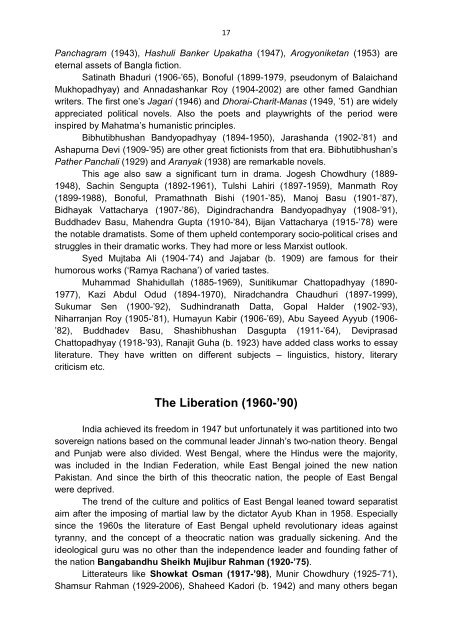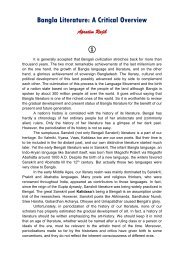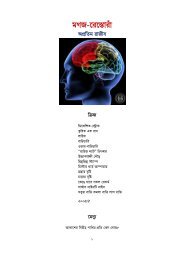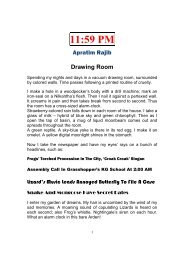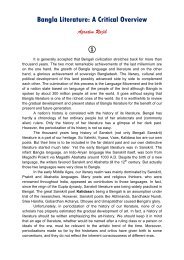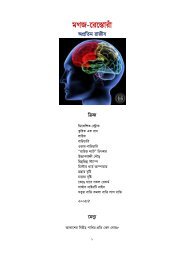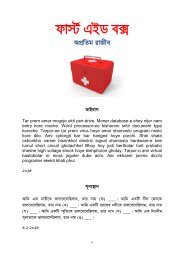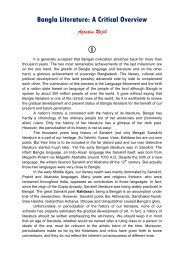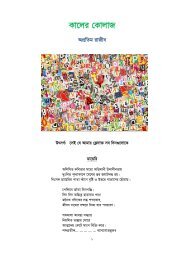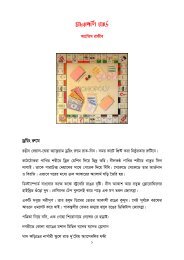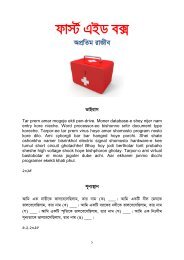BLiterature-Apratim
Create successful ePaper yourself
Turn your PDF publications into a flip-book with our unique Google optimized e-Paper software.
17<br />
Panchagram (1943), Hashuli Banker Upakatha (1947), Arogyoniketan (1953) are<br />
eternal assets of Bangla fiction.<br />
Satinath Bhaduri (1906-’65), Bonoful (1899-1979, pseudonym of Balaichand<br />
Mukhopadhyay) and Annadashankar Roy (1904-2002) are other famed Gandhian<br />
writers. The first one’s Jagari (1946) and Dhorai-Charit-Manas (1949, ’51) are widely<br />
appreciated political novels. Also the poets and playwrights of the period were<br />
inspired by Mahatma’s humanistic principles.<br />
Bibhutibhushan Bandyopadhyay (1894-1950), Jarashanda (1902-’81) and<br />
Ashapurna Devi (1909-’95) are other great fictionists from that era. Bibhutibhushan’s<br />
Pather Panchali (1929) and Aranyak (1938) are remarkable novels.<br />
This age also saw a significant turn in drama. Jogesh Chowdhury (1889-<br />
1948), Sachin Sengupta (1892-1961), Tulshi Lahiri (1897-1959), Manmath Roy<br />
(1899-1988), Bonoful, Pramathnath Bishi (1901-’85), Manoj Basu (1901-’87),<br />
Bidhayak Vattacharya (1907-’86), Digindrachandra Bandyopadhyay (1908-’91),<br />
Buddhadev Basu, Mahendra Gupta (1910-’84), Bijan Vattacharya (1915-’78) were<br />
the notable dramatists. Some of them upheld contemporary socio-political crises and<br />
struggles in their dramatic works. They had more or less Marxist outlook.<br />
Syed Mujtaba Ali (1904-’74) and Jajabar (b. 1909) are famous for their<br />
humorous works (‘Ramya Rachana’) of varied tastes.<br />
Muhammad Shahidullah (1885-1969), Sunitikumar Chattopadhyay (1890-<br />
1977), Kazi Abdul Odud (1894-1970), Niradchandra Chaudhuri (1897-1999),<br />
Sukumar Sen (1900-’92), Sudhindranath Datta, Gopal Halder (1902-’93),<br />
Niharranjan Roy (1905-’81), Humayun Kabir (1906-’69), Abu Sayeed Ayyub (1906-<br />
’82), Buddhadev Basu, Shashibhushan Dasgupta (1911-’64), Deviprasad<br />
Chattopadhyay (1918-’93), Ranajit Guha (b. 1923) have added class works to essay<br />
literature. They have written on different subjects – linguistics, history, literary<br />
criticism etc.<br />
The Liberation (1960-’90)<br />
India achieved its freedom in 1947 but unfortunately it was partitioned into two<br />
sovereign nations based on the communal leader Jinnah’s two-nation theory. Bengal<br />
and Punjab were also divided. West Bengal, where the Hindus were the majority,<br />
was included in the Indian Federation, while East Bengal joined the new nation<br />
Pakistan. And since the birth of this theocratic nation, the people of East Bengal<br />
were deprived.<br />
The trend of the culture and politics of East Bengal leaned toward separatist<br />
aim after the imposing of martial law by the dictator Ayub Khan in 1958. Especially<br />
since the 1960s the literature of East Bengal upheld revolutionary ideas against<br />
tyranny, and the concept of a theocratic nation was gradually sickening. And the<br />
ideological guru was no other than the independence leader and founding father of<br />
the nation Bangabandhu Sheikh Mujibur Rahman (1920-’75).<br />
Litterateurs like Showkat Osman (1917-’98), Munir Chowdhury (1925-’71),<br />
Shamsur Rahman (1929-2006), Shaheed Kadori (b. 1942) and many others began


